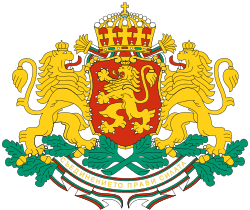Women in Bulgaria
 Four young Bulgarian women, 2008. | |
| Gender Inequality Index | |
|---|---|
| Value | 0.219 (2012) |
| Rank | 38th |
| Maternal mortality (per 100,000) | 11 (2010) |
| Women in parliament | 20.8% (2012) |
| Females over 25 with secondary education | 90.9% (2010) |
| Women in labour force | 48.6% (2011) |
| Global Gender Gap Index[1] | |
| Value | 0.7097 (2013) |
| Rank | 43rd out of 136 |
Women in Bulgaria are European women who live in and are from Bulgaria.
Emancipation
They live in a Bulgarian society that is customarily patriarchal. While Bulgaria is often described as a patriarchal society, women may have substantial authority in household budgeting or agricultural decision making. Both men and women have the right to vote and own property. Women lag behind men only slightly in educational achievement. Despite the socialist ideology of gender equality, women are often employed in lower paying jobs, remain responsible for most household chores, and represent more than half the registered unemployed. They also occupy leadership positions less frequently than men. Fewer than 14 percent of postsocialist parliamentary representatives have been women, and only one in five municipal councilors were women in 1996.[2]
Employment
Many women entered paid employment during the socialist era, when an ideology of gender equality was promoted, and they made up nearly half the workforce in the late twentieth century. Women are frequently employed as teachers, nurses, pharmacists, sales clerks, and laborers, and less often involved in management, administration, and technical sciences. Women are also largely responsible for household tasks—child care, cooking, cleaning, and shopping. Agricultural labor is divided according to gender, with men working with animals and machinery and women doing more hand labor in crop production, although flexibility exists in response to specific situations.[3]
Property inheritance
In principle, both men and women own property such as land, buildings, and animals, and inheritance is partible (i.e., property is divided among all heirs rather than going to a single heir). In practice, some heirs may be disinherited or may receive more land than their siblings, and daughters may inherit less land than sons. The latter is sometimes explained in terms of the often large dowries of household goods and sometimes land or livestock that women take into marriage. Houses are often inherited by youngest sons, who bring their wives to live in the family home.[4]
Military
In terms of military organization, women have historically been known to have been recruited to become soldiers for the Bulgarian army, particularly during critical times.
See also
- Women of medieval Bulgaria
References
External links
| Wikimedia Commons has media related to Women of Bulgaria. |
- Bulgaria, everyculture.com
- Women in Bulgarian Society: History and recent changes by Roumen L. Genov
- History of Bulgaria
- Women Medievalists and the Academy, edited by Jane Chance
| |||||||||||||||||||||||||||||||||||||||||
| ||||||||||||||

